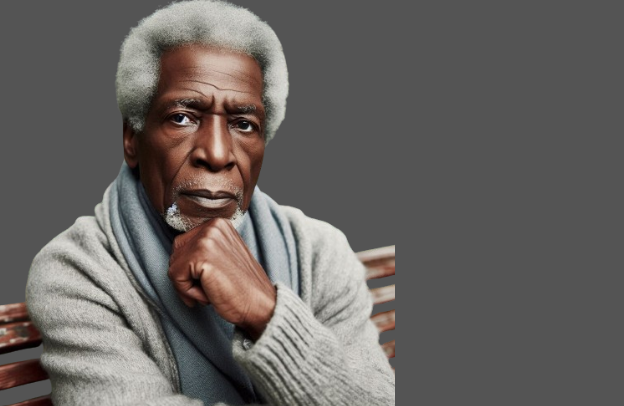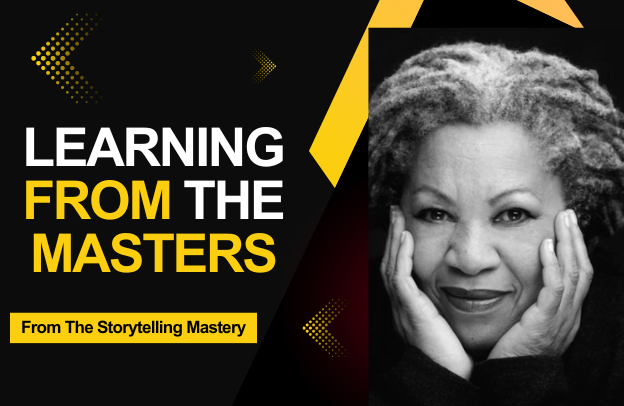Seven African Lessons About Self-Preservation

Why do you need to learn about self-preservation? Well, let me put the question to you like this: are you interested in living life to the fullest and passing down your experience to the next generation? Do you want to live intentionally, knowing that there is a reason behind what you do? If any of those makes sense to you then you need to pay attention to the topic of self-preservation.
Want to learn more about storytelling? Start by downloading the first chapter of The Storytelling Mastery.
Self-preservation ensures the survival and well-being of an individual, encompassing physical safety, mental health, and emotional resilience. It drives actions that protect one from harm, maintain one’s health, and foster personal growth, enabling one to adapt to challenges and thrive.
By prioritizing self-care and autonomy, individuals can lead fulfilling lives and contribute positively to their communities.
Self-preservation also includes ethical responsibility, ensuring that one’s actions align with personal values and support collective well-being.
Therefore, self-preservation is foundational for leading a balanced, healthy, and purposeful life. Now, here are seven African lessons about self-preservation. Make sure to pay attention to every one of them.
Lesson 1: The Ubuntu philosophy of I Am Because We Are
Now, close your eyes and imagine a bustling market in Johannesburg, South Africa, where vendors and buyers are engaged in a conversation, their interactions guided by the philosophy of Ubuntu, like my life and your life are interconnected.
Yes, you are seeing the market, but what you are actually seeing is the entire community of people in their delicate balance. This ancient African concept teaches that our humanity is intertwined and that one’s well-being is intrinsically connected to the well-being of others.
In practice, Ubuntu is about sharing experiences and resources, offering help to those in need, and fostering community resilience. It emphasizes that self-preservation is not a solitary endeavor but a collective one, where the strength of the individual is reinforced by the strength of the community.
See also Leadership Based on the Concept of Ubuntu
To apply this principle in your life, think carefully about your neighborhood or workplace. Actively engage with the people around you by offering help and support when needed. For instance, if a neighbor is unwell, you could cook a meal for them or help with their errands.
In the workplace, collaborate more with colleagues and help on projects, especially when someone is struggling. By supporting others, you contribute to a stronger, more resilient community, thereby reinforcing the idea that your well-being is connected to the well-being of those around you.
Lesson 2: Patience and Endurance as in The Wisdom of the Baobab
The baobab tree, often referred to as the “Tree of Life,” stands as a testament to resilience in the harsh landscapes of Africa. Found in the savannas, it can live for thousands of years, enduring drought and adverse conditions.
The baobab’s survival strategy includes storing water in its massive trunk and growing deep roots. This teaches the lesson of patience and long-term thinking. In life, enduring tough times and planning for the future are key to self-preservation, much like the baobab that thrives through preparedness and adaptability.
Here’s a practical way you can apply the lesson from the baobab tree’s wisdom of patience and endurance in your life. Imagine you are working towards a significant goal, like completing a degree, starting a business, or improving your health. Instead of seeking immediate results, focus on the long-term benefits and steadily work towards your goal.
Break down your larger objective into smaller, manageable tasks and consistently put in the effort over time, just like the baobab stores water and grows deep roots to survive harsh conditions.
When challenges arise, because they will do, remind yourself of the baobab’s resilience and maintain your patience. Understand that enduring tough times and staying committed to your long-term vision will eventually lead to growth and success.
Lesson 3. The Maasai’s Sense of Stewardship as Guardians of the Land
The Maasai people of Kenya and Tanzania are renowned for their deep connection to their land. Their way of life revolves around cattle herding, and their survival depends on the health of the ecosystems they inhabit.
The Maasai practice rotational grazing, ensuring that the land remains fertile and can sustain their herds. This sustainable approach to land management reflects a broader principle that to preserve oneself, one must also preserve the environment. By being stewards of their land, the Maasai ensure their own long-term survival and that of future generations.
If you are looking for a practical way to apply the Maasai’s sense of stewardship in your life, consider practicing environmental stewardship yourself.
Think about how you can care for your local environment just like the Maasai care for their land. Start by making sustainable choices in your daily life, such as reducing waste, recycling, and conserving water and energy. You could also get involved in community initiatives, like local clean-up drives or tree-planting events.
See also The Timeless Power of Gratitude: Five Life Lessons from Ancient Wisdom
By taking these actions, you are not only protecting the environment but also ensuring that it remains healthy and sustainable for future generations.
Just as the Maasai practice rotational grazing to maintain the land’s fertility, your efforts in environmental stewardship will help preserve and enhance your community’s natural resources.
Lesson 4: The Griot’s Legacy of Preserving Wisdom through Stories
In many West African cultures, griots are the keepers of oral history and tradition. These storytellers play a crucial role in preserving the collective memory and wisdom of their people.
Through their tales, they teach lessons of bravery, integrity, and communal values. This tradition underscores the importance of preserving cultural heritage as a means of self-preservation.
By remembering and learning from the past, individuals can navigate the present and future with greater wisdom and insight.
Here’s a practical way you can apply the griot’s legacy of preserving wisdom through stories in your life: Consider taking the time to share your personal experiences and family history with younger generations.
For instance, you can start a tradition of family storytelling during gatherings, where you recount meaningful anecdotes, lessons learned, and cultural heritage. If you are part of a community group, volunteer to share stories that carry valuable lessons and wisdom.
Think, for instance, our initiative of the Life and Legacy series in AClasses Academy, where we tell the story of prominent people in our community. In AClasses Academy, we are not only sharing these stories but also teaching people how they can do the same.
That is why the 5-part Storytelling Mastery exists, along with video training classes that teach people about the ABC of storytelling in AClasses Academy.
We even go as far as organizing weekly LinkedIn audio live events, where we bring in different experts to talk about the correct application of storytelling in different areas of our lives, like using it to build resilience in the African diaspora community or connecting with the right audience in the case of businesses.
You too can do the same by maybe documenting the stories of your people in a journal or creating a digital archive, and by so doing ensuring they are preserved for the future.
By sharing and preserving these stories, you not only keep the wisdom of the past alive but also inspire and educate others, much like the griots who pass down knowledge and tradition through their narratives.
Lesson 5: The Sankofa Bird and Learning from the Past
In Akan culture from Ghana, the symbol of the Sankofa bird, depicted looking backward with an egg in its mouth, embodies the idea that “it is not wrong to go back for that which you have forgotten.”
This lesson highlights the importance of understanding and learning from one’s history to build a better future. Self-preservation involves not just physical survival but also maintaining a connection to one’s roots, drawing strength and wisdom from the past to navigate the present.
See also Ancient Egyptian Wisdom to Live a Fulfilling Life Today
Do you want to apply the Sankofa bird’s lesson of learning from the past in your life? Then you might need to consider reflecting and learning from your past or the experiences of the people around you.
It will help you to take some time to regularly reflect on your past experiences, both successes and failures.
For instance, you might keep a journal where you write about past events, decisions, and their outcomes. Analyze what went well and what didn’t and think about the lessons you can draw from these experiences. If you have made mistakes, consider how you can avoid repeating them in the future.
Seek out also stories from older family members or mentors who have lived through similar situations, learning from their experiences and wisdom. By doing this, you embrace the Sankofa principle, using the past as a guide to make better decisions and enrich your present and future.
Lesson 6: Igbo Umunna and The Power of Extended Family
In Igbo culture from Nigeria, the concept of “Umunna” refers to the extended family and clan network. This support system provides individuals with social security, emotional support, and a sense of belonging.
During times of crisis, the Umunna steps in to provide financial help, shelter, and guidance. This lesson teaches that self-preservation is bolstered by strong family ties and community networks. In modern times, maintaining robust social connections can provide the necessary support to overcome challenges and thrive.
Here’s a practical way you can apply the Igbo Umunna lesson of the power of extended family in your life. It starts with building and strengthening family connections.
Make a conscious effort to strengthen your relationships with your extended family. This can be as simple as organizing regular family gatherings, whether in person or virtually, to keep everyone connected.
Take the initiative to reach out to cousins, aunts, uncles, and grandparents, checking in on their well-being and offering your support when needed. Celebrate milestones and support each other during difficult times.
See also The Timeless Power of Gratitude: Five Life Lessons from Ancient Wisdom
You could also create a family group chat or social media group to share updates and stay connected. By nurturing these relationships, you will build a strong support network that mirrors the Igbo concept of Umunna, ensuring that you and your family members have a reliable source of support, guidance, and companionship.
Lesson 7: The Zulu Philosophy of Indlela or The Path Forward
Among the Zulu of South Africa, the concept of “Indlela” translates to “the way” or “the path.” It signifies the journey of life and the choices one makes along the way. The Zulu believe that each person must find their own path but do so with a sense of purpose and direction.
This lesson emphasizes the importance of having a clear vision and goals for self-preservation. By staying focused and determined, individuals can navigate life’s challenges and achieve personal growth and fulfillment.
Here is a recommendation if you are looking for a practical way to apply the Zulu philosophy of Indlela, in your life. Consider setting and pursuing clear goals.
Think about what you want to achieve in different areas of your life, such as your career, personal development, or relationships. Start by setting clear, achievable goals and outline the steps needed to reach them.
Create a detailed plan, breaking down your objectives into smaller tasks that you can tackle one at a time. Regularly review your progress and adjust your plan as needed, staying flexible and open to change.
Just as the Zulu philosophy of Indlela emphasizes having a clear path and direction, maintaining focus on your goals while being adaptable will help you navigate life’s journey with purpose and clarity. This approach ensures you are consistently moving forward towards a fulfilling and meaningful life.
These lessons from African culture offer profound insights into self-preservation, blending the wisdom of the past with practical applications for the present. They remind us that to preserve oneself is also to preserve the community, the environment, and the heritage that shapes our identities.
Want to learn more about storytelling? Start by downloading the first chapter of The Storytelling Mastery.





